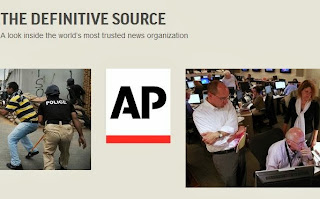 |
| Photo from http://blog.ap.org/ |
The following example uses correct AP style:
In an article titled “The Big Picture: Megapixel Race at Milestone 8” in Dante Holly’s Feb. 24 State of the Game column in the New York Times, CEO Jaden Gilbert said he loves playing "Farmville" on Facebook.
Notice:
- quotation marks on article titles and computer game titles but not on column names or publication names
- titled, not entitled
- abbreviate month when it's with a date
- no italics
- no underlines
More examples:
a) Software names such as Word and Excel
b) ... in his Digital Tools column in Top Dollar magazine.
c) TV shows such as ABC-TV’s “Dancing With the Stars”
d) ... in a New York Times article titled "Don't Try This at Home."
e) ... the video game “World of Warcraft.”
f) ... the computer game app "Farmville" on Facebook.
g) ... websites and apps like Facebook and Foursquare.
h) The dictionary is my
bible.
i) He left his Bible on the
chair.
j) … the book titled “And the Mountains Echoed" by Khaled Hosseini.
I offer explanations below. But for many of you, examples are easier than rules, so this would be a good place to stop reading if you've already got what you need.
(BTW, app is acceptable on first reference.)
***
If you want more, check out the explanations below. I put "no quotes" explanations in forest green and "yes quotes" explanations in brick red, to give you some extra reinforcement in a visual manner.
Here's a fake-logic "rule" to help you remember which items don't get quotation marks. If a name recurs every day/week/month -- as in a newspaper name, magazine name, software name, website name or app name -- think of it as a proper noun (a name) like John Smith or Spain. No matter which day you happen to pick up a periodical and look at it, the name is the same.
But if the "name" changes -- that is, if the specific title of an article that appears on that day and no other -- think of it as a title or, as the AP Stylebook says, a "composition title." Other examples of "compositions" in AP-speak are poems, lectures and songs. They all get quotes.
My fake-logic rule (Asking, "Does it recur?") is helpful but not consistent. It falls apart for TV show names, which take quotation marks, even though "Dancing With the Stars" is always called "Dancing With the Stars." In fake-logic, think of it this way: Broadcast is different from print.
What gets quotes? Think of artistry, entertainment and a plot line. By plot line, I mean a sequence of events in which characters overcome obstacles. A play, a novel, a movie, an opera and even a video game usually have plot lines, and their purpose is usually entertainment. Once you think about plays, novels and video games, it's not a big leap to also add other artistic items to the list: poem titles and song titles. These all get quotes.
AP's omission
The AP Stylebook does not specifically state that column names in periodicals are uppercase without quotation marks. However, at one point in time, I looked at the style used in Associated Press stories and saw that this was the case in actual use.
The Chicago Manual of Style, however, (which differs from AP style in some instances) specifically states that column names in periodicals are uppercase, without quotes and not in italics (as in the example I gave you at the beginning).
It used to be that you couldn't look up "software titles" in the A-Z section of the AP Stylebook. Instead, you had to look at "composition titles," which is an archaic term. Nowadays, you can find "software titles" under S as well as under "composition titles."
But you still can't find "video game titles" under V or any reference at all to column names. So I offer the above list and these examples for quick reference.
Lauren's tips & the 2012 edition
I hope this helps. Some of my AP style tips and tricks are original (sometimes involving what I call "fake logic"). They were created to fill in gaps in the guidance given by the AP itself, which never intended to become the de facto standard for industries outside of the news business. The AP Stylebook originally wasn't meant for the masses.
However, it has since become the de facto standard for the PR industry and lately also other industries. And as of the 2012 edition, the stylebook is more reader-friendly, seemingly in recognition of its increasing popularity. Bravo, AP!
If you don't have a 2012 or 2013 edition, I suggest you buy one now. I used to advise that a several-years-old stylebook is fine because very little changes from one year to the next. But the 2012 edition has a thousand and one improvements throughout, plus new sections that offer really great counsel to citizen journalists. I highly recommend you read the new "The Statement of News Values" and "Social Media Guidelines" sections.
The 2013 edition is similar to the 2012. Both are good.
The 2013 edition is similar to the 2012. Both are good.